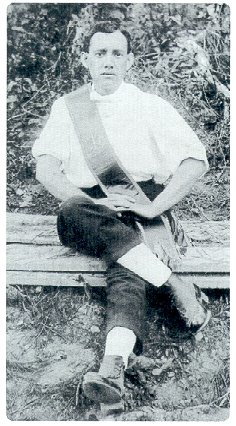
Kelly Harrell Biography- 1925
Kelly Harrell was a country balladeer with a golden voice. Harrell was born in 1889 in the Wythe County Virginia highlands which is the southwestern part of the state. When he was fourteen he worked in various textile mills. He enjoyed singing, though he didn't play an instrument, and was inspired to try recording in his belief that he was a better singer than fellow mill worker Henry Whitter, who had made records in 1923 and 1924.
In January, 1925 Harrell traveled to NYC where he arranged an audition and on Jan. 7 recorded several sides for Victor including “Butcher Boy,” “Roving Gambler” and “The New River Train,” a song already recorded by his friend Whitter. In August 25, and 26 1925 he arranged a session with Okeh (Ralph Peer) in Asheville, NC and brought Henry Whitter with him to play guitar and harmonica. He recorded “Wild Bill Jones,” "The Wreck of the Old 97," backed by "Blue Eyed Ella."
When Peer went to Victor, Harrell naturally followed him. Some of the songs he recorded later for Victor are “My Name John Johanna,” “In the Shadow Of The Pine,” “Nobody’s Darling on Earth” and “My Wife She has Gone and Left Me.” He also did duets (“Row Us O’er The Tide,” and “I Have No Loving Mother”) with Henry Norton featuring R.D. Hundley picking the banjo on 8-12-27. His songs with Virginia String Band included “For Seven Long Years I’ve Been Married,” “Charlie He’s A Good Old Man,” “Oh Molly Dear (Silver Dagger)” and “The Dying Hobo.”
Harrell recorded many important songs which were covered by other artists, including Jimmie Rodgers and Ernest Stoneman, in his own lifetime. Harrell’s only hit song was “Away Out on the Mountain,” which was popularized by Rodgers. The song brought Harrell $1,000 for composer’s royalties for the first three months of sales. Harrell played a song, “Away Out on the Mountain,” on WWNC radio on May of 1927 that Rodgers heard, learned and sang on the station. Since Harrell was not a songwriter, it can be assumed that he learned the song from other sources and Rodgers learned it from him.
He recorded the first version of Weevily Wheat entitled “Charlie, He’s A Good Old Man.” His version of “Charles Giteau” is the first and classic version of that ballad.
When the great depression hit in 1929, Victor refused to pay for musicians to accompany him and Harrell refused to pay. Harrell performed locally around Fieldale, Virginia and worked the textile mills until 1942, when a heart attack took his life. Bear Family on a triple-LP set reissued his complete recorded music in the 1970s, and an LP on the County label also represents him. His complete recorded works are currently available on a Document two CD set.
Songs recorded by Kelly Harrell: All My Sins Are Taken Away; Be at Home Soon Tonight, My Dear Boy; Beneath the Weeping Willow Tree; Blue Eyed Ella; Bright Sherman Valley (Red River Valley); Broken Engagement; Butcher's Boy; Bye and Bye You Will Forget Me; Cave Love Has Gained the Day; Charles Guiteau; Charley, He's a Good Old Man; Cuckoo She’s A Fine Bird; Dying Hobo; For Seven Long Years I've Been Married; Hand Me Down My Walking Cane; Henry Clay Beattie; Henpecked Man; I Have No Loving Mother Now; I Heard Somebody Call My Name; I Have No Loving Mother Now; I Love My Sweetheart the Best; I Want a Nice Little Fellow; I Was Born About 10,000 Years Ago; I Was Born in Pennsylvania; I Wish I Was a Single Girl Again; I'm Going Back to North Carolina; I’m Nobody’s Darling on Earth; In the Shadow of the Pines; Little Mohee; My Horses Ain't Hungry; My Name is John Johanna (State of Arkansas); My Wife. She Has Gone and Left Me; New River Train; Nobody's Darling on Earth; O! Molly Dear Go Ask Your Mother; Oh My Pretty Monkey; Peg and Awl; Rovin' Gambler; Row Us Over the Tide; She Just Kept Kissing On; Wild Bill Jones; Wreck On The Southern Old Ninety-Seven;